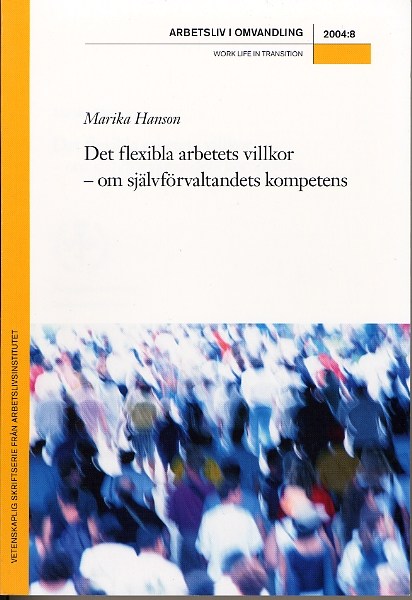Det flexibla arbetets villkor – om självförvaltandets kompetens
Abstract
Self-governing competence for flexible work
New conditions for work, involving demands for quick adjustment
and increased flexibility, have underpinned a discourse of work-based
and lifelong learning in which continuous competence development
is often viewed as beneficial for both the organisation and the employees.
These flexible work arrangements rely heavily on the individual’s
capacity of organising and structuring her own work and performance,
and the thesis addresses the question of the individual’s ability to adapt
to and handle these flexible work conditions. The aim is to contribute
to an understanding of the competencies required in flexible work
settings, and the thesis asks two questions: (1) What characterises the
work conditions in flexible forms of work? (2) How does the individual
handle these flexible work settings in terms of competence? The
theoretical frame of reference is constructivist and is contextually
oriented. Empirical data emanates from two case studies. The first
encompassing teleworking civil servants in a government authority
and the other freelance reporters. Data collection included questionnaires,
interviews and e-mail questions.
Results show that the flexible work settings in the case studies were
relatively disintegrated and deregulated in the sense that the conditions
were no longer lucid and well defined. It also appeared to open up a
space for regulation of a more implicit kind. These conditions require
a metacognitive competence characterised as a self-governing competence.
This refers to the guiding, supervising function needed for the
individual to be able to define, structure and discipline her own
performance and, ultimately, her ability to manage and govern herself
in a wider, functional sense. Thus, what seems to be characteristic for
the flexible and delimited work conditions is that the preconditions of
work do not appear in forms of an independent environment. Instead
of formal directives and limitations, the regulation of work takes place
to a large extent through implicit regulation processes, continuously
negotiated in interaction between individuals and the environment. In
conclusion it is argued that the flexible work conditions are characterised
by intersubjective regulation processes, discursively and interactively
constructed without perceptible coercion. The self-governing competence
required involves transformation in terms of continuous learning
as well as a development in terms of higher levels of cognitive complexity,
integration and differentiation.


